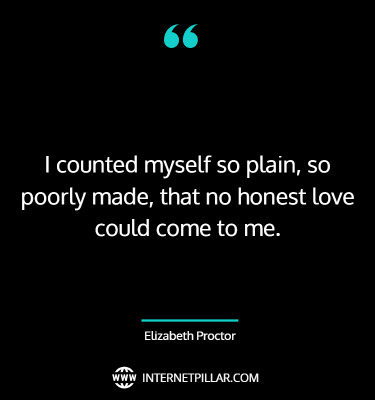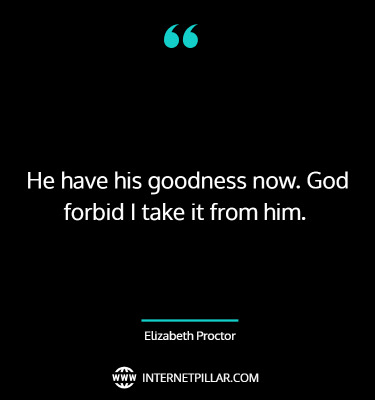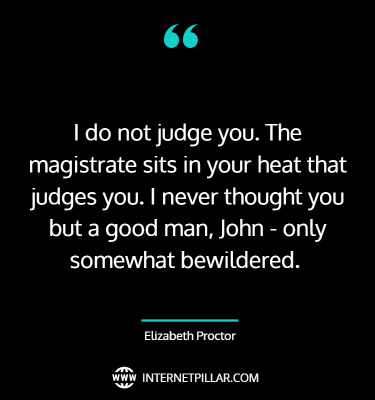Elizabeth Proctor is a moral Christian woman and is the most powerful character in ‘The Crucible’.
Elizabeth is first mischaracterized by Abigail as bitter and deceitful.
However, Elizabeth is revealed to be caring and sensitive, yet struggling with her husband John’s affair with Abigail.
Even after making efforts to mend their marriage, Elizabeth’s trust in John wavers. Elizabeth becomes colder when discovering John’s continued interactions with Abigail, demonstrating John’s flaw he can’t see.
Elizabeth embodies Christian values impressively but is arrested, facing a tough decision to protect John.

Reflecting during imprisonment, Elizabeth acknowledges her cold demeanor, growing wiser from her Salem experience, epitomizing goodness with inherent flaws, ending sadder as a widow post-trials.
Let’s go through some of the top quotes by Elizabeth Proctor.
Best Elizabeth Proctor Quotes

I counted myself so plain, so poorly made, that no honest love could come to me. ~ Elizabeth Proctor.

John you are not being open with me. ~ Elizabeth Proctor.

He have his goodness now. God forbid I take it from him. ~ Elizabeth Proctor.

It needs a cold wife to prompt lechery. ~ Elizabeth Proctor.

I do not judge you. The magistrate sits in your heat that judges you. I never thought you but a good man, John – only somewhat bewildered. ~ Elizabeth Proctor.
Famous Elizabeth Proctor Quotes
Great stones they lay upon his chest until he plead aye or nay. They say he give them but two words. ‘More weight,’ he says. And died… It were a fearsome man, Giles Corey. ~ Elizabeth Proctor.
It is her dearest hope, John, I know it. There be a thousand names; why does she call mine? There be a certain danger in calling such a name – I am no Goody Good that sleeps in ditches, nor Osburn, drunk and half-witted. She’d dare not call out such a farmer’s wife but there be monstrous profit in it. She thinks to take my place, John. ~ Elizabeth Proctor.
It is not my soul, John, it is yours. Only be sure of this, for I know it no Whatever you will do, it is a good man does it. I have read my own heart this three month, John. I have sins of my own to count. It needs a cold wife to prompt lechery… I counted myself so plain, so poorly made, no honest love could come to me! Suspicion kissed you when I did; I never knew how I should say my love. ~ Elizabeth Proctor.
So these were the 8 top Elizabeth Proctor quotes and sayings.
If you like these quotes and sayings, then you can also read my other posts on Freddy Krueger Quotes and Huey Freeman Quotes.
Short Biography of Elizabeth Proctor
Elizabeth Proctor, born Elizabeth Bassett in 1647 in Lynn, Massachusetts, was a notable figure in the 1692 Salem Witch Trials.
Married to John Proctor, she was convicted of witchcraft but escaped execution due to her pregnancy. In 1693, she was freed by the new governor, Sir William Phips.
| Full Name | Elizabeth Proctor |
| Born | 1647, Lynn, Massachusetts, United States |
| Spouse | John Proctor (m. 1674–1692) |
| Children | John Proctor III |
| Parents | William Bassett, Sarah Burt |
| Siblings | Mary Bassett DeRich |
Elizabeth remarried in 1699 and was officially exonerated in 1703 along with her late husband.
Her grandmother’s witchcraft accusations and the Puritan suspicion of Quakers may have influenced Elizabeth’s trial.
Quick Facts about Elizabeth Proctor
- Elizabeth Proctor, née Bassett, was involved in the 1692 Salem Witch Trials.
- She was married to John Proctor, who was executed for witchcraft.
- Elizabeth’s execution was delayed due to her pregnancy.
- In 1693, she was released from prison by Governor Sir William Phips.
- Elizabeth remarried in 1699 to Daniel Richards.
- Elizabeth and John Proctor’s convictions were reversed in 1703.
- Elizabeth was born in Lynn, Massachusetts, in 1647.
- She married John Proctor in 1674 in Salem.
- Elizabeth’s grandmother, a Quaker and midwife, was accused of witchcraft in 1669.
- Elizabeth’s servant Mary Warren claimed to see spectres, sparking accusations.
- John Proctor doubted the legitimacy of witchcraft accusations.
- Elizabeth was accused of witchcraft by Mercy Lewis and others in March 1692.
- A petition attesting to the Proctors’ good character was filed in April 1692.
- Another supportive petition was filed in May 1692.
- Elizabeth underwent a physical exam in June 1692, finding no “witch’s marks.”
- Both Elizabeth and John were sentenced to death in August 1692.
- Elizabeth’s execution was postponed until after her baby’s birth.
- Elizabeth gave birth to John Proctor III in prison in January 1693.
- Accusations extended to 141 complaints in 1692, involving Proctor family members.
- Elizabeth could not claim John’s property post-conviction due to legal dead status.
- Elizabeth fought to restore her legal rights and John’s estate.
- A formal apology for the trials was issued in 1702.
- In 1703, Elizabeth’s attainder was reversed, acknowledging her innocence.
- A 1705 petition sought equitable settlement for the accused.
- The Proctor family received financial compensation in 1711.
- Thorndike Proctor bought Downing Farm, marking the Proctor family residence until 1851.
- Not all condemned were exonerated by 1957; further efforts continued into the 2000s.
- In 1992, a resolution honored the courage of the condemned.
- In 2001, all involved were finally proclaimed innocent.
Top Questions about Elizabeth Proctor
A: Elizabeth Proctor was a woman convicted of witchcraft during the Salem Witch Trials in 1692, the wife of John Proctor.
A: Elizabeth was convicted of witchcraft but her execution was postponed due to her pregnancy. She was later freed by the new governor, Sir William Phips, in 1693.
A: Yes, her husband John Proctor was executed, and they lost their possessions as a result of the convictions.
A: Yes, in 1703, Elizabeth and her late husband John Proctor’s convictions were reversed by the Massachusetts legislature.
A: The accusations might have been influenced by her family’s history, as her grandmother was charged with witchcraft, and the negative view of Quakers by the Puritans, combined with societal suspicion and the behavior of the Proctors’ servant.
A: Elizabeth remarried Daniel Richards in 1699 and had to petition for the reversal of her attainder to restore her legal rights, which she eventually won, allowing her to regain some form of normalcy.
A: In 1711, the Massachusetts General Court reversed the judgments against many of the accused, including the Proctors, providing some compensation. However, complete exoneration for all involved took much longer, with the last acts of exoneration occurring in 2001.
A: Elizabeth is a character in Arthur Miller’s 1953 play “The Crucible,” which dramatizes the Salem Witch Trials, highlighting the themes of accusation, guilt, and justice.




